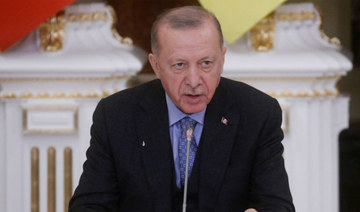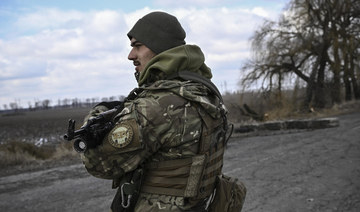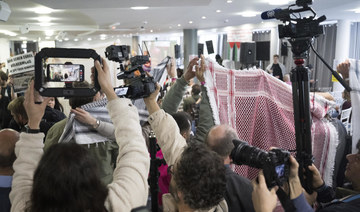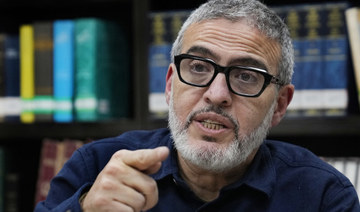MARIUPOL: An airstrike on a maternity hospital in the port city of Mariupol wounded women waiting to give birth and buried children in the rubble as Russian forces intensified their siege of Ukrainian cities. Bombs also fell on two hospitals in another city west of Kyiv.
The World Health Organization said Wednesday that it has confirmed 18 attacks on medical facilities since the Russian invasion began two weeks ago.
Ukrainian officials said the attack at a medical complex in Mariupol wounded at least 17 people.
The ground shook more than a mile away when the series of blasts hit. Explosions blew out windows and ripped away much of the front of one building. Police and soldiers rushed to the scene to evacuate victims, carrying a bleeding woman with a swollen belly on a stretcher past burning and mangled cars.
Another woman wailed as she clutched her child. In the courtyard, a blast crater extended at least two stories deep.
“Today Russia committed a huge crime,” said Volodymir Nikulin, a top regional police official, standing in the ruins. “It is a war crime without any justification.”
In Zhytomyr, a city of 260,000 to the west of Kyiv, bombs fell on two hospitals, one of them a children’s hospital, Mayor Serhii Sukhomlyn said on Facebook. He said there were no injuries.
President Volodymyr Zelenskyy said the Mariupol strike trapped children and others under debris.
“A children’s hospital. A maternity hospital. How did they threaten the Russian Federation?” Zelenskyy asked in his nightly video address, switching to Russian to express horror at the strike. “What kind of country is this, the Russian Federation, which is afraid of hospitals, afraid of maternity hospitals, and destroys them?”
He urged the West to impose even tougher sanctions, so Russia “no longer has any possibility to continue this genocide.”
Video shared by Zelenskyy showed cheerfully painted hallways strewn with twisted metal.
“There are few things more depraved than targeting the vulnerable and defenseless,” British Prime Minister Boris Johnson tweeted, adding that Russian President Vladimir Putin will be held “to account for his terrible crimes.”
The WHO said it had confirmed 10 deaths in attacks on health facilities and ambulances since the fighting began. It was not clear if its numbers included the assault on the maternity hospital.
US Secretary of State Antony J. Blinken condemned Russia’s “unconscionable attacks” in a call with his Ukrainian counterpart, Dmytro Kuleba, the State Department said.
Two weeks into Russia’s assault on Ukraine, its military is struggling more than expected, but Putin’s invading force of more than 150,000 troops retains possibly insurmountable advantages in firepower as it bears down on key cities.
Despite often heavy shelling on populated areas, American military officials reported little change on the ground over the previous 24 hours, other than Russian progress against the cities of Kharkiv and Mykolaiv, in heavy fighting. The officials spoke on condition of anonymity to assess the military situation.
Authorities announced new cease-fires to allow thousands of civilians to escape bombarded towns. Zelenskyy said three humanitarian corridors operated on Wednesday, from Sumy in the northeast near the Russian border, from suburbs of Kyiv and from Enerhodar, the southern town where Russian forces took over a large nuclear plant.
In all, he said, about 35,000 people got out. More evacuations were planned for Thursday.
People streamed out of Kyiv’s suburbs, many headed for the city center, as explosions were heard in the capital and air raid sirens sounded repeatedly. From there, the evacuees planned to board trains bound for western Ukrainian regions not under attack.
Civilians leaving the Kyiv suburb of Irpin were forced to make their way across the slippery wooden planks of a makeshift bridge, because the Ukrainians blew up the concrete span leading to Kyiv days ago to slow the Russian advance.
With sporadic gunfire echoing behind them, firefighters dragged an elderly man to safety in a wheelbarrow, a child gripped the hand of a helping soldier, and a woman inched her way along, cradling a fluffy cat inside her winter coat. They trudged past a crashed van with the words “Our Ukraine” written in the dust coating its windows.
“We have a short window of time at the moment,’’ said Yevhen Nyshchuk, a member of Ukraine’s territorial defense forces. “Even if there is a cease-fire right now, there is a high risk of shells falling at any moment.”
Previous attempts to establish safe evacuation corridors over the past few days largely failed because of what the Ukrainians said were Russian attacks. But Putin, in a telephone call with Germany’s chancellor, accused militant Ukrainian nationalists of hampering the evacuations.
In Mariupol, a city of 430,000 people on the Sea of Azov, local authorities hurried to bury the dead from the past two weeks of fighting in a mass grave. City workers dug a trench some 25 meters (yards) long at one of the city’s old cemeteries and made the sign of the cross as they pushed bodies wrapped in carpets or bags over the edge.
About 1,200 people have died in the nine-day siege of the city, Zelenskyy’s office said.
Nationwide, thousands are thought to have been killed, both civilians and soldiers, since Putin’s forces invaded. The UN estimates more than 2 million people have fled the country, the biggest exodus of refugees in Europe since the end of World War II.
The fighting knocked out power to the decommissioned Chernobyl nuclear plant, raising fears about the spent radioactive fuel that is stored at the site and must be kept cool. But the UN nuclear watchdog agency said it saw “no critical impact on safety” from the loss of power.
The crisis is likely to get worse as Moscow’s forces step up their bombardment of cities in response to what appear to be stronger Ukrainian resistance and heavier Russian losses than anticipated.
The Biden administration warned that Russia might seek to use chemical or biological weapons in Ukraine. The White House rejected Russian claims of illegal chemical weapons development in the country it has invaded.
This week, Russian Foreign Ministry spokeswoman Maria Zakharova — without evidence — accused Ukraine of running chemical and biological weapons labs with US support. White House press secretary Jen Psaki called the claim “preposterous” and said it could be part of an attempt by Russia to lay the groundwork for its own use of such weapons against Ukraine.
British Defense Secretary Ben Wallace said Russia’s assault will get “more brutal and more indiscriminate” as Putin tries to regain momentum.
Britain’s Defense Ministry said fighting continued northwest of Kyiv. Kharkiv, Chernihiv, Sumy and Mariupol were being heavily shelled and remained encircled by Russian forces.
Russian forces are placing military equipment on farms and amid residential buildings in the northern city of Chernihiv, Ukraine’s military said. In the south, Russians in civilian clothes are advancing on the city of Mykolaiv, a Black Sea shipbuilding center of a half-million people, it said.
The Ukrainian military, meanwhile, is building up defenses in cities in the north, south and east, and forces around Kyiv are “holding the line” against the Russian offensive, authorities said.
WHO: Maternity hospital among 18 Ukraine medical centers hit
https://arab.news/8rg4e
WHO: Maternity hospital among 18 Ukraine medical centers hit
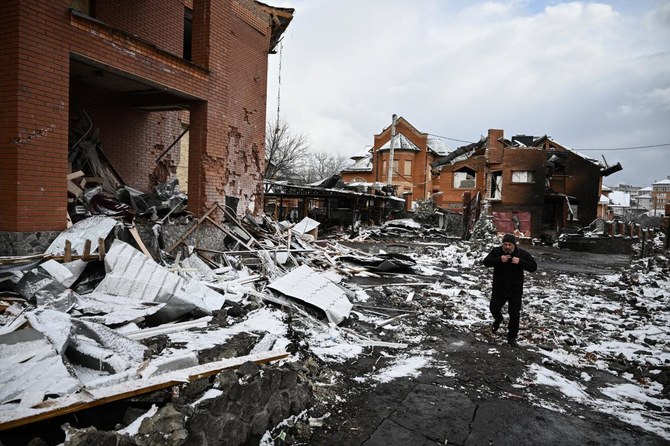
- Ukrainian officials said the attack at a medical complex in Mariupol wounded at least 17 people
- In Zhytomyr, a city of 260,000 to the west of Kyiv, bombs fell on two hospitals, one of them a children’s hospital
Netherlands remembers World War Two dead amid tight security due to Gaza war
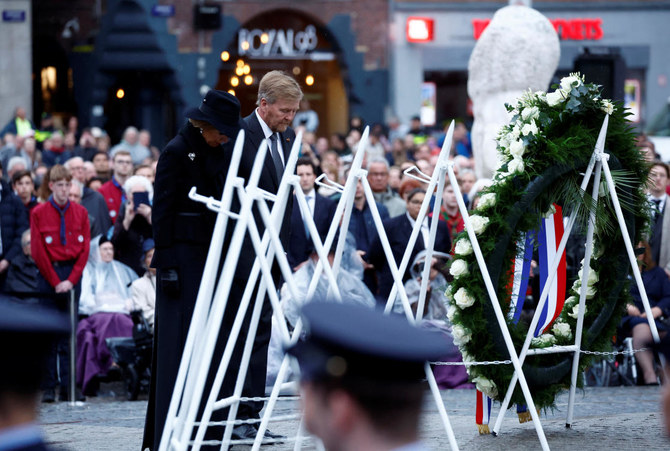
Earlier this week municipal authorities announced unprecedented security measures to keep the ceremony safe and avoid possible disruptions linked to the Israel-Hamas war
AMSTERDAM: Dutch King Willem-Alexander and Prime Minister Mark Rutte joined around 4,000 people on Saturday for the country’s annual World War Two remembrance ceremony amid restricted public access and heightened security due to the war in Gaza.
The ceremony on Amsterdam’s central Dam square, with the traditional two minutes of silence at 8 p.m. (1800 GMT) to commemorate the victims of World War Two, passed smoothly despite fears that there might be protests.
Normally some 20,000 people attend the Dam commemoration without having to register. But earlier this week municipal authorities announced unprecedented security measures to keep the ceremony safe and avoid possible disruptions linked to the Israel-Hamas war.
At the opening of a Holocaust Museum in Amsterdam in March, pro-Palestinian protesters opposed to Israel’s military campaign in Gaza set off fireworks and booed Israeli President Isaac Herzog as he arrived on a visit.
Every town and the city in the Netherlands holds its own remembrance ceremony on May 4 and tens of thousands of people attend the events. The Netherlands then marks on May 5 the anniversary of its liberation from Nazi occupation in 1945.
Drone footage shows Ukrainian village battered to ruins as residents flee Russian advance
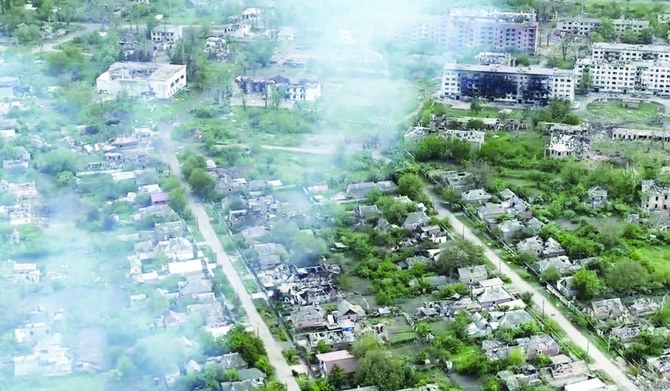
- Residents have scrambled to flee the village, among them a 98-year-old woman who walked almost 10 kilometers (6 miles) alone last week, wearing a pair of slippers and supported by a cane, until she reached Ukrainian front lines
KYIV: The Ukrainian village of Ocheretyne has been battered by fighting, drone footage obtained by The Associated Press shows. The village has been a target for Russian forces in the Donetsk region of eastern Ukraine.
Russian troops have been advancing in the area, pounding Kyiv’s depleted, ammunition-deprived forces with artillery, drones and bombs. Ukraine’s military has acknowledged the Russians have gained a “foothold” in Ocheretyne, which had a population of about 3,000 before the war, but says that fighting continues.
Residents have scrambled to flee the village, among them a 98-year-old woman who walked almost 10 kilometers (6 miles) alone last week, wearing a pair of slippers and supported by a cane, until she reached Ukrainian front lines.
FASTFACT
Ukraine’s military has acknowledged the Russians have gained a “foothold” in Ocheretyne, which had a population of about 3,000 before the war, but says that fighting continues.
Not a single person is seen in the footage, and no building in Ocheretyne appears to have been left untouched by the fighting. Most houses, apartment blocks and other buildings look damaged beyond repair, and many houses have been pummeled into piles of wood and bricks. A factory on the outskirts has also been badly damaged.
The footage also shows smoke billowing from several houses, and fires burning in at least two buildings.
Elsewhere, Russia has in recent weeks stepped up attacks on Kharkiv, Ukraine’s second-largest city, in an attempt to pummel the region’s energy infrastructure and terrorize its 1.3 million residents.
Four people were wounded and a two-story civilian building was damaged and set ablaze overnight after Russian forces struck Kharkiv, in northeastern Ukraine, with exploding drones, regional governor Oleh Syniehubov said Saturday.
The four, including a 13-year-old, were hurt by falling debris, he said on the Telegram messaging app.
Russian state agency RIA reported Saturday reported that Moscow’s forces struck a drone warehouse in Kharkiv that had been used by Ukrainian troops overnight, citing Sergei Lebedev, described as a coordinator of local pro-Moscow guerrillas. His comments could not be independently verified.
Syniehubov said Russia also bombed Kharkiv on Friday, damaging residential buildings and sparking a fire. An 82-year-old woman died and two men were wounded.
Ukraine’s military said Russia launched a total of 13 Shahed drones at the Kharkiv and Dnipropetrovsk regions of eastern Ukraine overnight, all of which were shot down by Ukrainian air defenses.
Sadiq Khan, Pakistani immigrant bus driver’s son, makes history by winning third term as London mayor
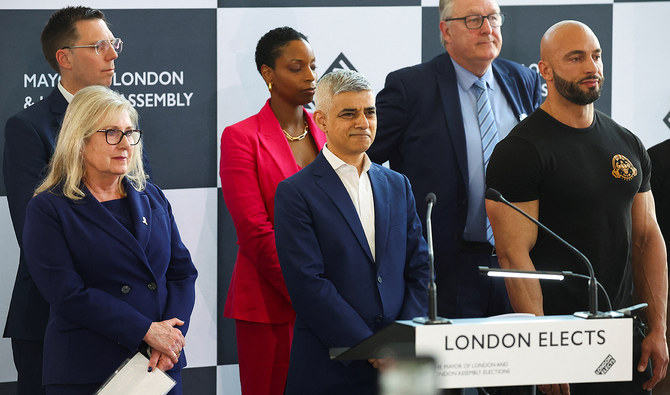
- Khan, an official with global renown, became the first Muslim mayor of a Western capital when elected in 2016
- Born in London in 1970, he grew up in public housing the Tooting area and slept in a bunk-bed until he was 24
LONDON: Sadiq Khan, who was Saturday re-elected for a record third term as London mayor, rose from humble roots to spar with world leaders and bring consequential change to the British capital.
The 53-year-old Labor party politician – a former human rights lawyer brought up on a London public housing complex – comfortably defeated Conservative rival Susan Hall for a third stint at City Hall.
He now overtakes predecessor Boris Johnson as the longest-serving holder of the post, which notably has powers over the emergency services, transport and planning in the city of nearly nine million.
Victory continues a remarkable journey for the Pakistani immigrant bus driver’s son, who became the first Muslim mayor of a Western capital when initially elected in 2016.
As mayor, he has made a name for himself as a vocal critic of Brexit and successive Conservative prime ministers, including Johnson, as well as for a feud with former US president Donald Trump.
The pair became embroiled in an extraordinary war of words after Khan criticized Trump’s travel ban on people from certain Muslim countries.
Trump then accused Khan of doing a “very bad job on terrorism” and called him a “stone cold loser” and a “national disgrace.”
The mayor in turn allowed an infamous blimp of Trump dressed as a baby in a nappy to fly above protests in Parliament Square during his 2018 visit to Britain.
“He once called me a stone cold loser. Only one of us is a loser, and it’s not me,” Khan told AFP during his 2021 campaign.
But Khan’s own tenure has not been without its controversies, particularly over last year’s expansion of an Ultra-Low Emission Zone into the largest pollution-charging scheme in the world.
The daily toll on the most-polluting vehicles prompted a fierce backlash in outer boroughs of Greater London, with anger at the extra financial burden during a cost-of-living crisis.
Khan has also been criticized for failing to get to grips with high levels of knife crime and since last year, his handling of large weekly pro-Palestinian protests.
Born in London in 1970 to parents who had recently arrived from Pakistan, Khan was the fifth child out of seven brothers and one sister.
He grew up in public housing in Tooting, an ethnically mixed residential area in south London, and slept in a bunk-bed until he was 24.
His modest background plays well in a city that is proud of its diversity and loves a self-made success story.
Khan still regularly recalls how his father drove one of London’s famous red buses, and his mother was a seamstress.
He is a handy boxer, having learnt the sport to defend himself in the streets against those who hurled racist abuse at him, and two of his brothers are boxing coaches.
He initially wanted to become a dentist, but a teacher spotted his gift for verbal sparring and directed him toward law.
He gained a law degree from the University of North London and started out as a trainee lawyer in 1994 at the Christian Fisher legal firm, where he was eventually made a partner.
He specialized in human rights, and spent three years chairing the civil liberties campaign group Liberty.
He represented Louis Farrakhan, leader of the Nation of Islam movement, and Babar Ahmad, a mosque acquaintance who was jailed in the United States after admitting providing support to the Taliban regime in Afghanistan.
Khan joined Labor aged 15 when Conservative prime minister Margaret Thatcher was in her pomp.
He became a local councilor for Tooting in the Conservative-dominated Wandsworth local borough in 1994, and its member of parliament in 2005.
He still lives in the area with his lawyer wife Saadiya and their two teenage daughters.
Labor prime minister Gordon Brown made him communities minister in 2008 and he later served as transport minister, becoming the first Muslim minister to attend Cabinet meetings.
In parliament, he voted for gay marriage – which earned him death threats.
As mayor, he vowed to focus on providing affordable homes for Londoners and freezing transport fares, but – like many in power around the world – saw his agenda engulfed by the pandemic.
He is London’s third mayor after Labor’s Ken Livingstone (2000-2008) and Johnson (2008-2016), with widespread speculation he could eventually try to follow in his predecessor and become prime minister.
London mayor Khan wins historic third term as Tories routed in local polls

- Khan, 53, easily beat Tory challenger Susan Hall to scupper largely forlorn Tory hopes that they could prise the UK capital away from Labour for the first time since 2016
- In the West Midlands, where Tory incumbent Andy Street is bidding for his own third term, votes were reportedly being recounted and too close to call
LONDON: London’s Labour mayor Sadiq Khan on Saturday secured a record third term, dealing the Conservatives another damaging defeat in their worst local election results in recent memory months before an expected general election.
Khan, 53, easily beat Tory challenger Susan Hall to scupper largely forlorn Tory hopes that they could prise the UK capital away from Labour for the first time since 2016.
The first Muslim mayor of a Western capital when first elected then, he had been widely expected to win as Labour surge nationally and the Conservatives suffer in the polls.
In the end, he saw his margin of victory increase compared to the last contest in 2021.
It adds to a dismal set of results for Prime Minister Rishi Sunak, as his Tories finished a humiliating third in local council tallies after losing nearly 500 seats in voting Thursday across England.
With Labour making huge gains, the beleaguered leader’s Conservatives lost crunch mayoral races in Manchester, Liverpool, Yorkshire as well as the capital and elsewhere.
In the West Midlands, where Tory incumbent Andy Street is bidding for his own third term, votes were reportedly being recounted and too close to call.
An unexpected Tory defeat there could leave Sunak with only one notable success: its mayor winning a third term in Tees Valley, northeast England — albeit with a vastly reduced majority.
Writing in Saturday’s Daily Telegraph, Sunak conceded “voters are frustrated” but insisted “Labour is not winning in places they admit they need for a majority.”
“We Conservatives have everything to fight for,” Sunak argued.
Labour, out of power since 2010 and trounced by Boris Johnson’s Conservatives at the last general election in 2019, also emphatically snatched a parliamentary seat from the Conservatives.
It seized on winning the Blackpool South constituency and other successes to demand a national vote.
“Let’s turn the page on decline and usher in national renewal with Labour,” party leader Keir Starmer told supporters Saturday in the East Midlands, where the party won the mayoral race.
Sunak must order a general election be held by January 28 next year at the latest, and has said he is planning on a poll in the second half of 2024.
Labour has enjoyed double-digit poll leads for all of Sunak’s 18 months in charge, as previous Tory scandals, a cost-of-living crisis and various other issues dent the ruling party’s standing.
On Thursday, they were defending nearly 1,000 council seats, many secured in 2021 when they led nationwide polls before the implosion of Johnson’s premiership and his successor Liz Truss’s disastrous 49-day tenure.
With almost all those results in by Saturday afternoon, they had lost close to half and finished third behind the smaller centrist opposition Liberal Democrats.
If replicated in a nationwide contest, the tallies suggested Labour would win 34 percent of the vote, with the Tories trailing by nine points, according to the BBC.
Sky News’ projection for a general election using the results predicted Labour will be the largest party but short of an overall majority.
Its by-election scalp in Blackpool — on a mammoth 26-percent swing — was the Conservatives’ 11th such loss in this parliament, the most by any government since the late 1960s.
Speculation has been rife in Westminster that restive Tory lawmakers could use the dire local election results to try to replace him. But that prospect seems to have failed to materialize.
However, it was not all good news for Labour.
The party lost control of one local authority, and suffered some councillor losses to independents elsewhere, due to what analysts said was its stance on the Israel-Hamas war.
Polling expert John Curtice assessed there were concerning signs for the opposition.
“These were more elections in which the impetus to defeat the Conservatives was greater than the level of enthusiasm for Labour,” he noted in the i newspaper.
“Electorally, it is still far from clear that Sir Keir Starmer is the heir to (Tony) Blair.”
A British-Palestinian doctor was denied entry to France for a Senate meeting about the war in Gaza
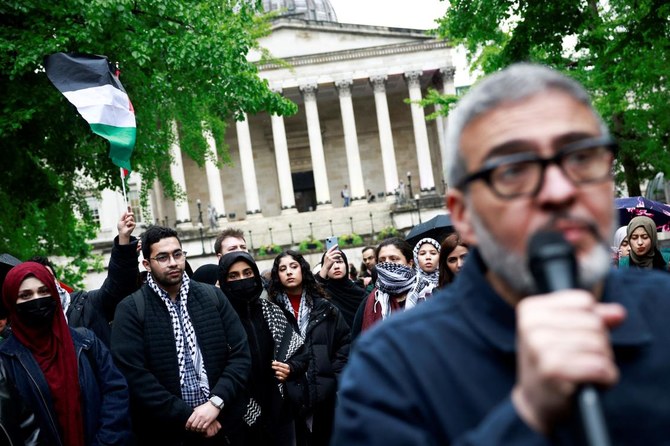
- Dr. Ghassan Abu Sitta was placed in a holding zone in the Charles de Gaulle airport and will be expelled, according to French Sen. Raymonde Poncet Monge
- Abu Sitta posted on social networks that he was denied entry in France because of a one-year ban by Germany on his entry to Europe
PARIS: A well-known British-Palestinian surgeon who volunteered in Gaza hospitals said he was denied entry to France on Saturday to speak at a French Senate meeting about the Israel-Hamas war. Authorities wouldn’t give a reason for the decision.
Dr. Ghassan Abu Sitta was placed in a holding zone in the Charles de Gaulle airport and will be expelled, according to French Sen. Raymonde Poncet Monge, who had invited him to speak at the Senate.
‘’It’s a disgrace,’’ she posted on X.
Abu Sitta posted on social networks that he was denied entry in France because of a one-year ban by Germany on his entry to Europe. Germany denied him entry last month, and France and Germany are part of Europe’s border-free Schengen zone. He posted Saturday that he was being sent back to London.
The French Foreign Ministry, Interior Ministry, local police and the Paris airport authority would not comment on what happened or give an explanation.
Abu Sitta had been invited by France’s left-wing Ecologists group in the Senate to speak at a colloquium Saturday about the situation in Gaza, according to the Senate press service. The gathering included testimony from medics, journalists and international legal experts with Gaza-related experience.
Last month Abu Sitta was denied entry to Germany to take part in a pro-Palestinian conference. He said he was stopped at passport control, held for several hours and then told he had to return to the UK He said airport police told him he was refused entry due to “the safety of the people at the conference and public order.”
Abu Sitta, who recently volunteered with Doctors Without Borders in Gaza, has worked during multiple conflicts in the Palestinian territories, beginning in the late 1980s during the first Palestinian uprising. He has also worked in other conflict zones, including in Iraq, Syria and Yemen.
France has seen tensions related to the Mideast conflict almost daily since the deadly Oct. 7 Hamas incursion into Israel. In recent days and weeks police have cleared out students at French campuses holding demonstrations and sit-ins similar to those in the United States.



